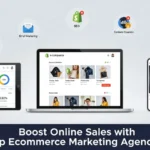
The Future of Digital Marketing: How AI is Changing the Game
A look at how artificial intelligence is revolutionizing digital marketing, improving efficiency, personalization, and results.
The AI Revolution in Digital Marketing: An Overview
Artificial intelligence (AI) is no longer a futuristic concept; it’s a present-day reality reshaping digital marketing strategies and practices. From automating mundane tasks to providing deep consumer insights, AI is driving unprecedented levels of efficiency, personalization, and data-driven decision-making. Businesses that embrace AI are gaining a significant competitive advantage, transforming how they connect with their audiences and achieve their marketing goals. This shift requires marketers to understand and adapt to the evolving landscape, ensuring they leverage AI to its full potential. To learn more about the impact of AI in digital marketing, see AI’s Impact on Digital Marketing: Strategies for Success.
AI-Powered Personalization: Tailoring Experiences
AI is enabling a new era of hyper-personalization, where content and experiences are tailored to individual users. This goes beyond basic segmentation, offering customized interactions that resonate deeply with each customer. The ability to understand and respond to individual preferences and behaviors is transforming how brands engage with their audiences, leading to increased engagement and conversions.

Understanding Hyper-Personalization
Hyper-personalization involves delivering highly customized content and experiences based on individual user data. This approach leverages AI to analyze vast amounts of data, including demographics, behavior, and preferences, to create tailored interactions. The goal is to provide each user with a unique and relevant experience, fostering stronger connections and driving engagement. For a step-by-step guide on using AI in Meta Ads, check out Unlocking Meta Ads Success: Your AI-Powered Guide.
AI Tools for Personalization
Several AI tools and technologies are instrumental in personalizing marketing efforts. These include AI-powered recommendation engines, which suggest products or content based on user behavior; chatbots that provide personalized customer service; and dynamic content optimization tools that adjust website content based on user profiles. These tools enable marketers to deliver highly relevant and engaging experiences, enhancing customer satisfaction.
Benefits of Personalized Marketing
Personalized marketing offers significant advantages, including increased engagement, higher conversion rates, and improved customer loyalty. By delivering tailored content and experiences, brands can create stronger connections with their audience, leading to better outcomes. AI-driven personalization is also essential for enhancing customer experiences and building lasting relationships. According to Nielsen, AI is transforming how brands connect with their audiences. For 59% of global marketers, AI for campaign personalization and optimization is the most impactful industry trend poised to make a difference by 2025. See more in How AI is redefining marketing, today and tomorrow – Nielsen.
Automating the Mundane: AI’s Role in Efficiency
AI is streamlining many repetitive tasks, freeing up marketers to focus on strategic initiatives. Automation reduces manual effort, minimizes errors, and significantly boosts productivity. By automating routine processes, marketers can allocate more time and resources to creative and strategic activities, leading to more effective campaigns and better results.

Automating Content Creation
AI assists in generating and optimizing content for various platforms. AI tools can draft blog posts, social media updates, and even ad copy, saving marketers valuable time. These tools also analyze content performance, suggesting improvements to enhance engagement and reach. For example, learn how to use AI to create high-converting ad creatives by reading How to Use AI to Create High-Converting Ad Creatives….
AI-Driven Campaign Management
AI automates campaign setup, optimization, and reporting. Tools can automatically set up campaigns across multiple channels, optimize ad spend based on real-time data, and generate detailed performance reports. This automation ensures campaigns are always running efficiently and effectively, maximizing ROI. This is key to staying ahead in the digital world. For more on this, check out The Future of Marketing: How AI is Changing the Game.
Time and Resource Savings
Automation offers significant time and cost savings. By automating repetitive tasks, marketers can reduce manual effort and allocate resources more efficiently. This allows for faster campaign launches, quicker responses to market changes, and a greater focus on strategic initiatives. Learn how to master AI digital marketing with our step-by-step guide: How to Master Digital Marketing with AI: A Step-by-Step Guide….
Predictive Analytics: Forecasting the Future
AI excels at predictive analytics, enabling data-driven decision-making and forecasting future trends. By analyzing vast datasets, AI can identify patterns and predict future outcomes, empowering marketers to make informed decisions and stay ahead of the competition.

Analyzing Customer Behavior
AI analyzes customer data to predict future actions and preferences. By understanding customer behavior, marketers can anticipate needs and tailor their strategies accordingly. This includes predicting which products a customer is likely to buy next. Learn more in How AI is Changing Digital Marketing.
Forecasting Market Trends
AI can identify and forecast emerging market trends. By analyzing market data, AI can help marketers anticipate future shifts and adapt their strategies to stay competitive. This ability is crucial for long-term success in the ever-changing digital marketing landscape.
Data-Driven Decision Making
Data-driven insights are essential for effective marketing strategies. AI provides the tools and insights needed to make informed decisions, optimize campaigns, and drive better results. This approach ensures that marketing efforts are based on solid data and are aligned with business goals.
The Ethical Considerations of AI in Marketing
As AI becomes more prevalent in marketing, ethical considerations become increasingly important. Data privacy, transparency, and responsible implementation are critical to building trust and maintaining a positive brand reputation.

Data Privacy and Security
Protecting user data and ensuring privacy is paramount. Marketers must adhere to data privacy regulations and implement robust security measures to safeguard sensitive information. This builds trust and demonstrates a commitment to ethical practices.
Transparency and Disclosure
Transparency in AI-driven marketing practices is essential. Consumers should be aware when AI is used to personalize their experiences or make decisions. Transparency builds trust and allows consumers to make informed choices.
Responsible AI Implementation
Ethical considerations should guide the implementation of AI strategies. This includes ensuring fairness, avoiding bias, and prioritizing user well-being. Marketers must embrace responsible AI practices to build a sustainable and ethical approach to marketing.
Conclusion
Embracing AI is no longer optional; it’s essential for staying competitive in the future of digital marketing. By leveraging AI for personalization, automation, predictive analytics, and ethical practices, marketers can drive better results and build stronger customer relationships. The key to success lies in understanding AI technologies, embracing data-driven strategies, and prioritizing ethical considerations. For a comprehensive guide to using AI in your marketing efforts, check out Boost Your Marketing: A Guide to Using Gemini.
FAQ
How is AI changing digital marketing?
AI is transforming digital marketing by enabling personalization, automating tasks, providing predictive analytics, and enhancing overall efficiency.
What are the benefits of using AI in marketing?
Benefits include increased efficiency, improved personalization, data-driven decision-making, and enhanced customer engagement.
What are the ethical concerns related to AI in marketing?
Concerns include data privacy, transparency, and the responsible use of AI technologies.
How can marketers prepare for the AI-driven future?
Marketers should focus on understanding AI technologies, embracing data-driven strategies, and prioritizing ethical considerations.



